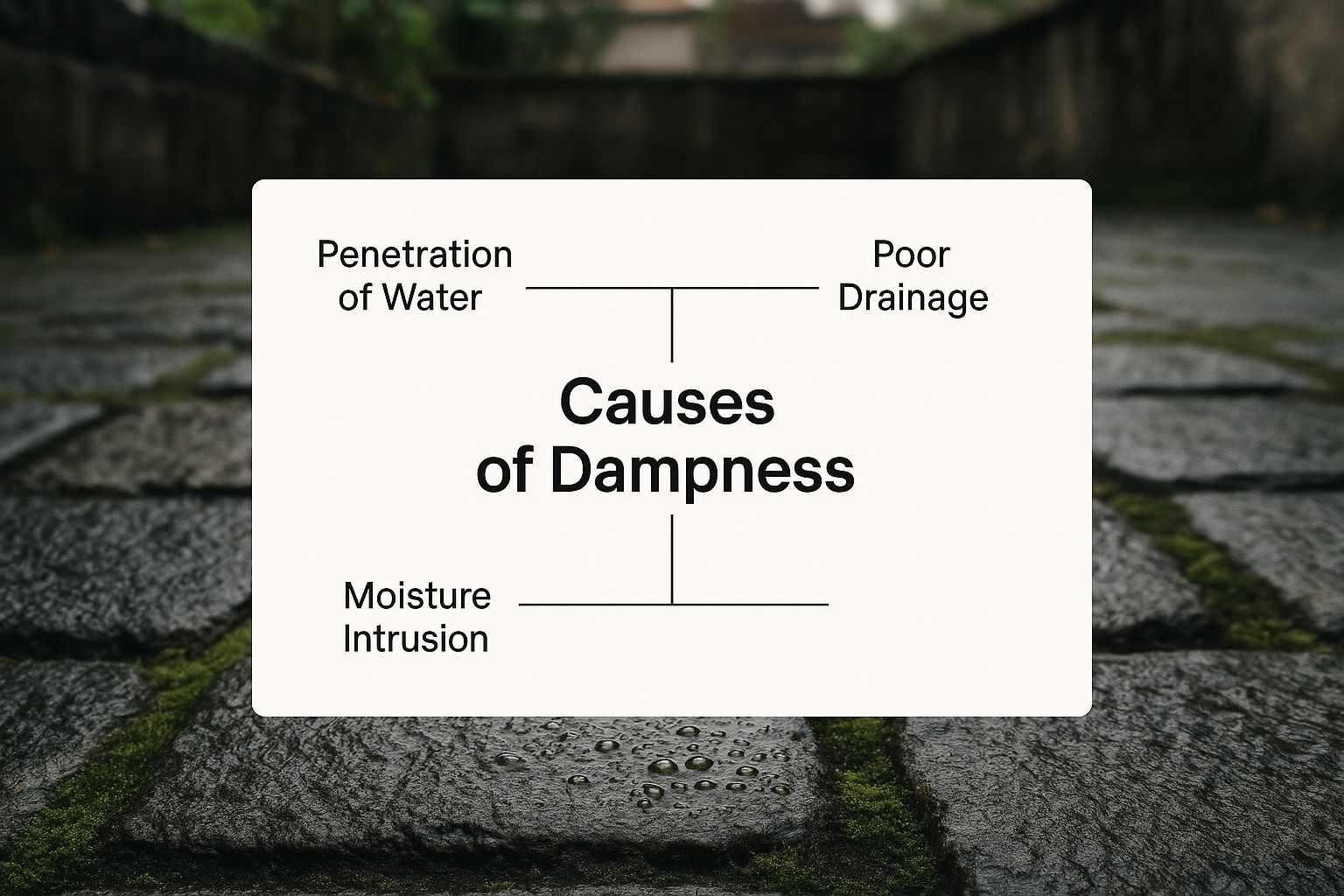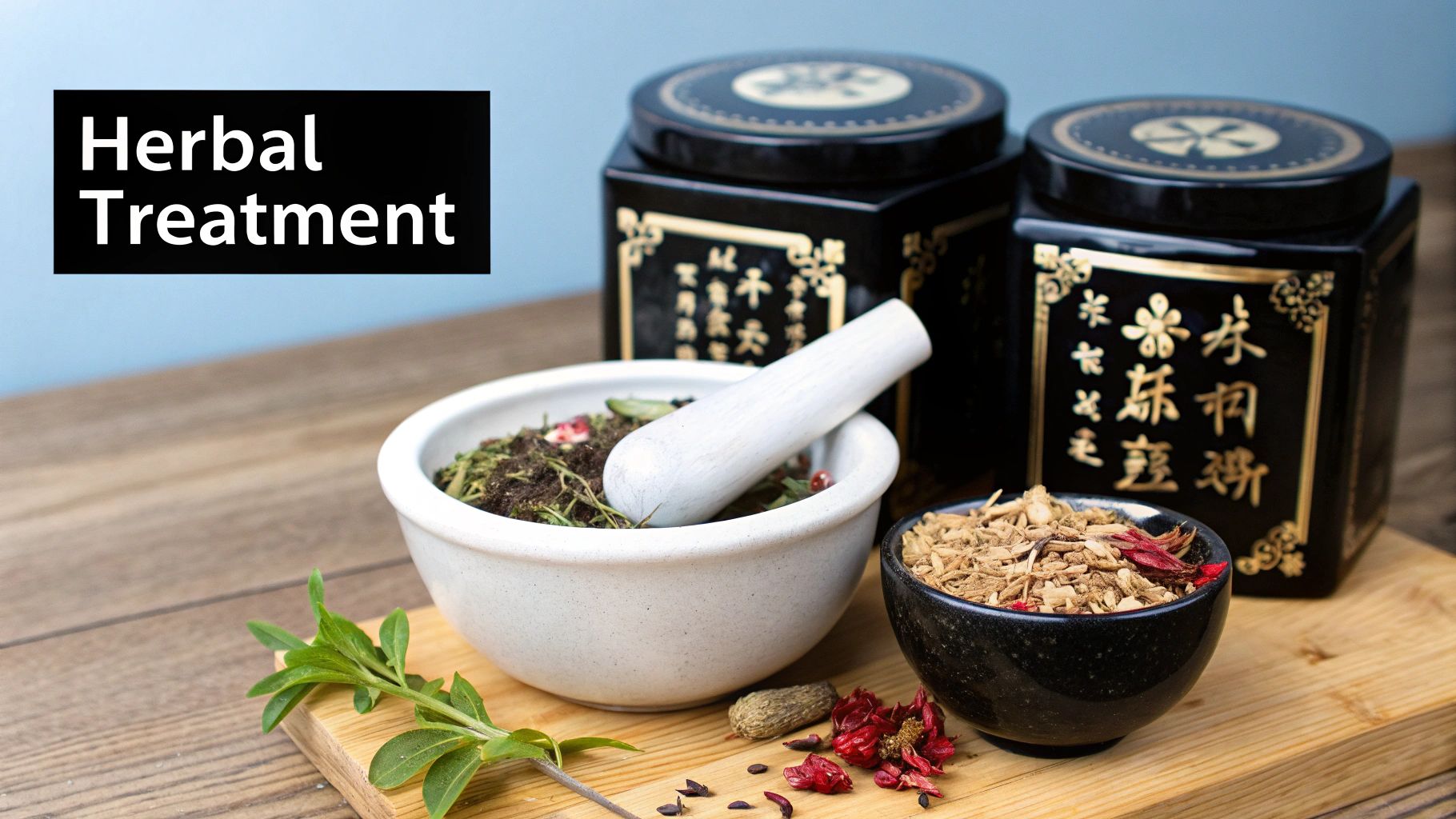Ever feel like you're moving through a thick fog, even on a clear day? That’s a great starting point for understanding dampness in Chinese medicine. Imagine your body is like a waterlogged sponge—heavy, swollen, and just not working at its best.
This isn't about being literally wet. Instead, dampness is a concept in Traditional Chinese Medicine that describes an internal environment where things have become sluggish and bogged down. It's a pathogenic influence that gets in the way of your vital energy, or Qi, preventing it from flowing freely.
Defining Dampness: The Body's Internal Fog
In the world of Chinese medicine, optimal health is all about maintaining a state of dynamic balance. Dampness is one of the key things that throws this balance off, creating stagnation and a pervasive sense of heaviness.
Think about the air on a muggy, humid summer afternoon. It feels thick, oppressive, and heavy, right? When that same kind of condition builds up inside your body, it can seriously impair your physical functions and even cloud your thinking.
This isn't some new-age idea. The principles of Chinese medicine have been developed and refined for over 2,000 years. Today, practitioners in a global TCM market valued at over $50 billion USD regularly diagnose and treat conditions rooted in dampness.
From a clinical perspective, dampness is seen as heavy, sticky, and stagnant. It has a tendency to sink downwards in the body and can easily team up with other factors like Cold or Heat, creating more complicated health patterns.
From Mist to Sludge
Dampness doesn't just show up overnight. It can build up in stages, starting as a light mist that might cause some brain fog or a bit of lethargy.
If you don't address it, that mist can condense and thicken, turning into something more like a sticky sludge or what we call phlegm. This is when more serious issues can appear, such as cysts, stubborn weight gain that won't budge, or chronic sinus congestion.
Recognizing dampness is so important because many practitioners believe it's a foundational cause of many common modern health problems. Its defining features are pretty distinct:
- Heaviness: A feeling of leaden limbs or a head that feels too heavy for your neck.
- Stickiness: Symptoms that are stubborn, hard to shake, and just seem to linger forever.
- Stagnation: It gums up the works, obstructing the flow of Qi and blood, which often leads to bloating, sluggishness, and puffiness.
When this internal environment takes hold, it becomes incredibly difficult for your body’s systems—especially your digestive system—to do their jobs properly. The first step to clearing this internal fog is simply learning to recognize it. From there, you can start taking steps to restore your body’s natural energy and vitality.
Where Dampness Comes From: Internal vs. External Causes
To really get a handle on dampness in Chinese medicine, we have to look at where it starts. It’s not a single thing, but rather a condition that can arise from two very different sources. Think of it like a house becoming damp: the problem could be a leaky roof (an external issue) or a plumbing leak inside the walls (an internal one).
The first source is External Dampness. This is essentially an invasion from your environment. If you live somewhere with high humidity, work in a damp space, or even just get caught in a downpour and don't dry off properly, that outside moisture can seep past your body's defenses.
This type of dampness tends to settle in the joints and muscles. It's what causes that familiar achy, heavy sensation that always seems to get worse on rainy days. It’s as if your body has literally soaked up the weather, leaving you feeling sluggish and stiff.
The More Common Source: Internal Dampness
While the environment can definitely play a role, the most common and persistent form of dampness is actually generated from within. This is Internal Dampness, and its root cause almost always traces back to a struggling digestive system.
In the world of Chinese medicine, the Spleen is the key organ system in charge of transforming the food and drink we consume into Qi (energy) and healthy body fluids. When the Spleen is weak, this whole process becomes sluggish and inefficient.
Instead of creating clean, vibrant energy, a compromised Spleen produces a cloudy, sludgy byproduct. That byproduct is internal dampness. From there, it circulates throughout the body, gumming up the works and creating that all-too-common feeling of heaviness, bloating, and brain fog.
This chart helps break down the primary causes of dampness in the body.

As you can see, both our surroundings and what’s happening inside our bodies are critical factors in whether this pathogenic factor builds up.
How Modern Habits Create Dampness
So, what weakens the Spleen in the first place? More often than not, our modern lifestyles and diets are the primary culprits. The Spleen thrives on foods that are warm, dry, and easy to digest, but many of our daily habits do the exact opposite.
While ancient TCM texts identified six external pathogenic factors (including environmental dampness) that could invade the body, internal dampness from poor digestive function is rampant today. Modern diets packed with greasy, sugary, and dairy-rich foods are a major contributor.
Think about it: foods like ice cream, greasy pizza, and an overload of sweets are known to be particularly damp-producing. They lead directly to symptoms like clogged sinuses, indigestion, and excess phlegm. You can learn more about this dual nature of dampness from other practitioners.
Key Takeaway: You can't always control the weather, but you have tremendous influence over the internal dampness your body creates. The most powerful strategy for resolving this stubborn condition is to strengthen your digestive system from the inside out.
By understanding these two distinct sources, you can start to connect the dots between your environment, your daily choices, and why you might be feeling sluggish, bloated, or mentally foggy.
Recognizing The Signs Of Dampness In Your Body And Mind

While "dampness" might sound a bit abstract, its effects on your body and mind are anything but. Think of it as an internal fog that obstructs the natural flow of your body’s energy (Qi) and fluids. The result? A collection of symptoms that all point to heaviness, stagnation, and a general feeling of being sluggish.
Learning to spot these signs is the first, most crucial step toward clearing out that internal murkiness and getting your vitality back. The symptoms rarely show up alone; instead, they tend to appear as a cluster of related issues that can impact everything from your digestion and energy to your mental clarity.
Physical Manifestations Of Dampness
Physically, dampness often feels exactly like it sounds—like you're being weighed down. It's a stubborn, sticky quality that can make even simple movements feel like a chore. This isn't just about being tired; it’s a deep, persistent sluggishness that a good night's sleep just can't seem to shake.
Here are some of the classic physical red flags to look for:
- A Feeling of Heaviness: Your arms and legs might feel leaden, or you could have a sensation of a tight, heavy band wrapped around your head.
- Persistent Fatigue: This is a profound lethargy that leaves you feeling drained and unmotivated, especially right after waking up.
- Digestive Upset: Dampness gums up the works of your digestive system, leading to stubborn bloating, a poor appetite, loose stools, or a constant feeling of fullness.
- Puffiness and Swelling (Edema): You might notice puffiness around your eyes, face, or ankles as your body struggles to move fluids properly.
- Excessive Mucus or Phlegm: Are you dealing with chronic sinus congestion, a relentless post-nasal drip, or a cough that produces a lot of phlegm? These are hallmark signs.
One of the most telling clues is right in the mirror. A quick look at your tongue can reveal a lot. In TCM, a tongue with a thick, greasy, or sticky-looking coating is a classic indicator of internal dampness. To see exactly what to look for, you can explore a helpful TCM tongue diagnosis chart.
Mental And Emotional Symptoms
The influence of dampness doesn't stop at your physical body. Just as it creates a sludge in your digestive tract, it can also cloud your mind and weigh down your emotions. This is a core concept in Chinese medicine: the mind and body are not separate, but deeply intertwined.
A classic description of mental dampness is the feeling of having your head wrapped in a wet towel. It’s a sense of being muffled, unable to think clearly or access your thoughts with any real speed or precision.
This mental fog can be incredibly frustrating, making even simple daily tasks feel overwhelming and complex.
Here’s how dampness can manifest mentally and emotionally:
- Brain Fog: You might struggle with concentration, find your memory is slipping, or just feel like your thoughts are muddled.
- Emotional Heaviness: A sense of being emotionally "stuck," bogged down by worry, or trapped in a cycle of overthinking is very common.
- Lack of Motivation: That physical lethargy has a mental counterpart. It becomes difficult to feel inspired, engaged, or proactive about anything.
To give you a clearer picture, let's compare these two sides of the same coin.
Common Symptoms of Dampness Physical vs Mental
| Symptom Category | Physical Manifestations | Mental & Emotional Manifestations |
|---|---|---|
| Sensation | Feeling of heaviness in the limbs or head; general sluggishness. | Muddled thinking, brain fog, and a "fuzzy" head feeling. |
| Energy Levels | Persistent fatigue, especially in the morning; feeling drained. | Lack of motivation, apathy, and difficulty feeling engaged. |
| Bodily Fluids | Swelling/edema, excessive mucus, phlegm, or loose stools. | Tendency toward overthinking, worry, and feeling "stuck." |
| Digestion | Bloating, poor appetite, nausea, and a feeling of abdominal fullness. | Difficulty processing information and making decisions. |
By recognizing these patterns, you can start to connect the dots and see how an abstract concept like dampness translates into your real-life, day-to-day experience. Identifying these symptoms is your first step toward addressing the root cause and restoring clear, flowing energy to both body and mind.
Why Your Digestion Is Key to Overcoming Dampness
In Chinese medicine, the battle against internal dampness is almost always won or lost in the gut. The main player here is the Spleen, but it’s crucial to understand we're not talking about the anatomical organ you'd see in a biology textbook. In this system, the Spleen is the energetic engine driving your entire digestive process.
Think of your Spleen as a powerful, efficient furnace. Its job is to take everything you eat and drink and "cook" it, transforming it all into pure, usable energy, or Qi. When this furnace burns brightly, it creates clean fuel that nourishes every part of your body and leaves behind no gunk or residue.
When the Digestive Fire Weakens
But what happens if that furnace gets weak? Poor diet, chronic stress, or even just persistent overthinking can smother its flames. Instead of burning fuel cleanly, a weakened Spleen sputters and struggles, leaving behind a sludgy, half-processed residue.
This gunk, this metabolic waste, is exactly what dampness is in Chinese medicine. It begins to circulate and settle in different parts of the body, creating that heavy, sluggish feeling we’ve been talking about. It's the source of that internal fog, the stubborn bloating, and the fatigue that sleep just can't seem to fix.
Dampness is considered a Yin pathogen, which means it’s heavy, sticky, and tends to stagnate. It weighs down and obstructs the body's Yang energy—the force responsible for movement and warmth. This is why dampness leads to blockages in the flow of both energy and fluids. For more detail on this dynamic, you can explore how dampness impacts bodily systems.
The Real Source of Dampness
This makes the Spleen the primary creator of internal dampness. While living in a humid climate can certainly make things worse, the dampness generated inside your own body from a weak digestive fire is usually the most stubborn kind to clear.
Here’s how it happens, step-by-step:
- A Weak Spleen: Your digestive engine is compromised by diet, stress, or other habits.
- Improper Transformation: It can't properly process food and fluids.
- Dampness is Produced: A sludgy byproduct is created instead of clean Qi.
- Symptoms Appear: This dampness builds up, causing bloating, heaviness, brain fog, and more.
This is why just trying to "dry out" the dampness without fixing the underlying problem is like constantly mopping the floor while ignoring the leaky pipe. The mess will just keep coming back.
When you focus on strengthening your digestion, you're not just clearing the dampness you have now—you're turning off the tap. Our guide to the best foods for digestive health is a great place to begin. Supporting your Spleen is the single most important thing you can do to resolve dampness from the inside out and get back to feeling light and clear.
Practical Strategies to Clear Dampness and Restore Balance

Knowing the what and why of dampness is the first step. Now, let’s talk about how to clear it out. Getting rid of this internal fog isn't about finding a magic bullet; it's about making deliberate shifts in your diet, lifestyle, and therapeutic support. The core strategy is to strengthen your digestive system—the Spleen—to essentially turn off the tap that's creating the dampness in the first place.
This is your practical toolkit. It breaks down the most effective methods into manageable steps, giving you the confidence to tackle what is dampness in Chinese medicine and build lasting balance from the inside out.
Nourish Your Body with an Anti-Dampness Diet
Hands down, the most powerful tool you have for resolving dampness is what you put on your plate. The goal is simple: eat foods that strengthen your digestive fire and avoid those that smother it. Think of every meal as a choice—either you’re building clean, vibrant energy, or you're creating more of that sluggish residue.
A great place to start is by making sure most of your food is warm, cooked, and easy to digest. Your Spleen thrives on gentle warmth because it helps with the transformation and transportation of nutrients, which means your body doesn't have to work so hard.
Here are some key food groups to bring into your kitchen:
- Aromatic Spices: Think ginger, cinnamon, cardamom, and fennel. These are fantastic for warming up your digestive system and helping that dampness dissipate.
- Damp-Draining Grains: Job's tears (also known as coix seed), barley, and rye are famous in TCM for their ability to promote urination and help leach dampness out of the body.
- Spleen-Strengthening Vegetables: Root vegetables like sweet potatoes and carrots, along with squash and pumpkin, are deeply nourishing for the Spleen. Lightly cooked greens are also wonderful.
- Legumes: Adzuki beans, in particular, are little powerhouses for drying dampness and supporting healthy digestive function.
Just as important as what you add is what you take away. Some foods are notorious for creating a damp, sluggish internal environment.
Key Insight: The foods that generate the most dampness are often cold, raw, sweet, or greasy. This list includes dairy products (especially cheese and milk), refined sugar, fried foods, and too many raw salads or ice-cold smoothies, which can extinguish your digestive fire.
Your food choices have a direct impact on your body’s ability to produce clear energy instead of sluggishness.
When it comes to fighting dampness, your diet is your first line of defense. The table below offers a simple guide to help you choose foods that will strengthen your Spleen and reduce dampness, while also highlighting the culprits that tend to make it worse.
Anti-Dampness Diet Foods to Eat and Avoid
| Food Category | Foods to Incorporate (Spleen-Strengthening) | Foods to Avoid (Damp-Inducing) |
|---|---|---|
| Grains | Job's tears, barley, rye, quinoa, rice | Wheat in excess, refined flour products (bread, pasta) |
| Vegetables | Sweet potato, squash, pumpkin, carrots, parsnips, cooked greens | Raw vegetables (salads), cucumbers, tomatoes in excess |
| Fruits | Cooked fruits (stewed apples/pears), berries in moderation | Bananas, watermelon, iced fruit smoothies, tropical fruits |
| Proteins | Adzuki beans, lentils, chickpeas, lean meats (chicken, turkey) | Fatty meats, pork, dairy (milk, cheese, yogurt), soy milk |
| Spices & Herbs | Ginger, cinnamon, cardamom, fennel, turmeric, garlic | None—most warm spices are beneficial |
| Sweets & Oils | Small amounts of honey/maple syrup | Refined sugar, artificial sweeteners, fried/greasy foods |
| Beverages | Warm herbal teas (ginger, chai), room temperature water | Iced drinks, sodas, beer, milk, excessive fruit juice |
By making conscious swaps and prioritizing warm, nourishing meals, you give your digestive system the support it needs to function optimally and keep dampness at bay.
Lifestyle Adjustments to Promote Flow
Beyond what you eat, simple changes to your daily routine can make a huge difference in how your body manages fluids and energy. The goal here is to encourage movement and avoid stagnation, which is the very essence of dampness.
One of the best habits you can build is incorporating moderate, consistent exercise. You don’t need to run a marathon. Activities like brisk walking, tai chi, or qigong are perfect because they get your Qi and fluids circulating without causing the kind of exhaustion that can actually weaken the Spleen.
Managing stress is also non-negotiable. In Chinese medicine, chronic worry and overthinking are said to "knot" the Spleen's energy, which directly impairs its function. Bringing practices like mindfulness, meditation, or even just a few minutes of quiet, deep breathing into your day can help soothe your mind and, in turn, support healthier digestion.
Professional Therapies for Targeted Support
While diet and lifestyle changes are the foundation, professional TCM treatments can give you a major boost and speed up your progress. These therapies work on a deeper level to unblock stagnation, strengthen organ function, and resolve dampness from the root.
- Acupuncture: An acupuncturist uses fine needles at specific points to directly strengthen the Spleen, kickstart fluid metabolism, and clear the blockages that lead to that heavy feeling and brain fog.
- Herbal Medicine: A custom herbal formula is one of the most direct and powerful ways to address dampness. A trained herbalist can create a blend of herbs tailored specifically to your body to dry dampness, tonify your Spleen Qi, and address your unique pattern of symptoms.
- Cupping and Moxibustion: These are often used alongside acupuncture. Cupping is fantastic for moving stagnant Qi and blood, while moxibustion—the gentle burning of the herb mugwort—introduces a deep, penetrating heat that can warm the Spleen and help dry out dampness.
By weaving these strategies together, you create a comprehensive approach to not just clear dampness but to reclaim your energy and vitality for good.
Your Questions on Dampness Answered
As we've worked through the concept of dampness in Chinese medicine, you've probably started connecting the dots to your own life. That’s great! But it's also where the real, practical questions pop up. It’s one thing to understand an idea, but it's another to know how to apply it.
This section is all about tackling those common "what ifs" and "hows" head-on. Think of it as your quick-reference guide for clearing up any lingering confusion and feeling more confident as you start making changes for your health.
How Long Does It Take to Clear Dampness from the Body?
This is easily the most common question I hear, and the honest answer is: it really depends on you. There's no one-size-fits-all timeline. The time it takes to resolve dampness hinges on how long it’s been hanging around, how severe your symptoms are, and how consistently you can stick with the necessary changes.
If your case is relatively mild and new, you could start feeling lighter and clearer within a few weeks of dedicated dietary and lifestyle shifts. For more chronic, deep-seated dampness that has been building up for years, the process is more of a marathon than a sprint—it could take several months of patient, focused effort.
Important Takeaway: Think of this less like a quick fix and more like coaxing your body's internal environment back into balance. Patience and consistency are your two best friends on this journey.
Can I Have Dampness Even If I Live in a Dry Climate?
Yes, absolutely. This is a huge point of confusion for many people. While living in a humid, swampy area certainly doesn't help, internal dampness is a different beast altogether. It's generated from the inside out, primarily by what's happening with your digestion.
You could be living in the driest desert, but if your diet is full of damp-producing foods—too much sugar, dairy, greasy meals, or an excess of cold, raw items—your body can still create that internal sludge. On top of that, things like chronic stress or just plain overworking yourself can weaken your digestive fire (what we call Spleen Qi), making you susceptible to dampness no matter the weather outside.
What Is the Difference Between Dampness and Phlegm in TCM?
A great way to understand this is to think about their form. Dampness is like a pervasive, formless mist or fog. It’s what causes that feeling of heaviness, puffiness, and mental fogginess. It's fluid, widespread, and doesn't have a distinct shape.
Now, imagine that mist sits around for a while, stagnates, and starts to thicken. It congeals and transforms into phlegm. Phlegm is much more substantial and tangible. It can be the visible stuff, like mucus you cough up or sinus congestion. But it can also be "invisible," forming things like nodules, cysts, or creating a feeling of blockage somewhere in the body. At its core, phlegm is simply condensed, concentrated dampness.
Are There Specific Herbal Teas That Can Help with Dampness?
Yes! Simple herbal teas can be a wonderfully gentle and effective way to support your body in resolving dampness. They generally work by strengthening your digestion, promoting healthy fluid metabolism, and warming up your core.
A few excellent choices include:
- Barley Tea: A classic for strengthening the Spleen and helping to drain dampness.
- Adzuki Bean Tea: This one is fantastic for gently leaching dampness out of the body through urination.
- Aged Tangerine Peel (Chen Pi) Tea: Especially helpful for moving stagnant Qi and transforming dampness right in the digestive system.
- Ginger Tea: Perfect for warming up the digestive "furnace," which is essential for preventing dampness from forming in the first place.
While these are great teas to start with, it's always best to work with a qualified TCM practitioner who can recommend what's perfectly suited to your unique constitution and specific symptoms.
If you're tired of feeling bogged down by symptoms of dampness and want a personalized plan to get back on track, Eric Tsai Acupuncture and Herbs is here to guide you. Dr. Eric Tsai specializes in creating individualized treatment plans that blend acupuncture, herbal medicine, and practical lifestyle advice to get to the root of your health concerns. Take the first step toward feeling lighter and more vibrant by booking a consultation.

